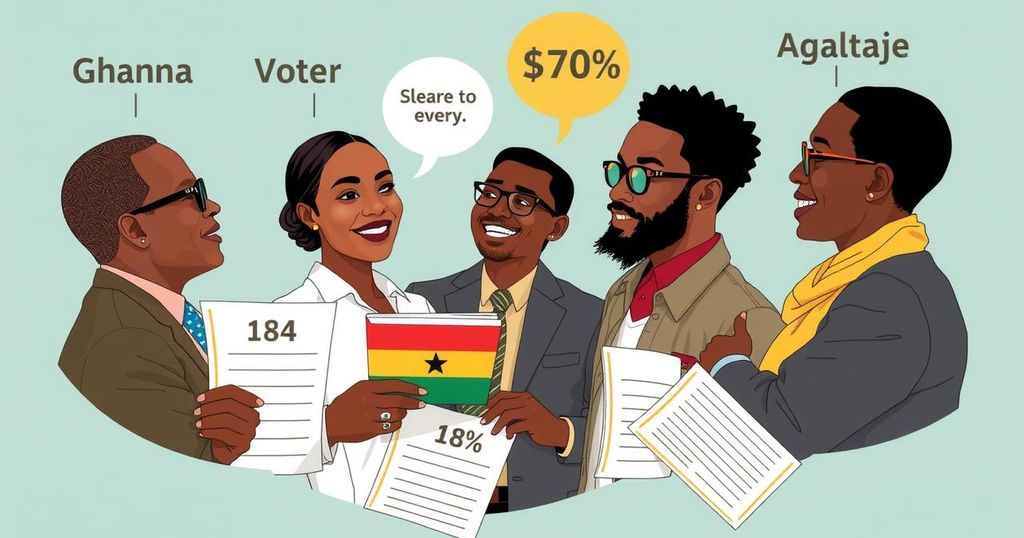Ghana Elections: Voter Concerns Amid Economic Challenges Ahead of Polls

Ghana’s ninth general election is marked by significant economic challenges, including high inflation and rising unemployment. Voters, especially youth, express concerns over economic management as the NPP seeks a third consecutive term. The election outcome will heavily depend on voter perceptions of the current economic landscape rather than historical stability.
Ghana approaches its ninth general election since the reestablishment of multiparty politics in 1992, with implications for its two leading parties: the National Democratic Congress (NDC) and the New Patriotic Party (NPP), each having held power for 16 years. Currently, the NPP seeks an unprecedented third consecutive term amidst growing voter concerns.
Increasing inflation has notably impacted the economic landscape, peaking at an annual rate of 54.1% in December 2022, significantly burdening consumers. Essentials such as eggs and tomatoes have more than doubled in price over the past year. Although the popular dish Ga kenkey has not escalated drastically in price, serving sizes have decreased, suggesting a decline in living standards. This economic strain has resulted in increased poverty rates, corroborated by the World Bank.
The Ghanaian government faced financial challenges when it defaulted on its debt obligations in 2022, necessitating ongoing negotiations with international creditors and reliance on the International Monetary Fund for a bailout. President Nana Akufo-Addo acknowledged the crisis, attributing it to external factors rather than governmental mismanagement, despite opposition claims otherwise.
Ghana’s national debt has progressively risen, reaching alarming levels that consume over 70% of government income for debt servicing. Concurrently, unemployment has surged, particularly among youth—ages 15 to 24—where nearly 30% are jobless compared to one in seven overall. This demographic’s priorities could significantly sway the election results.
With Ghana being a principal gold producer, discussions surrounding the environmental impact of mining practices have intensified. The rising global gold prices continue to attract interest, while the country also boasts rich deposits of oil, gas, cocoa, and other minerals vital for its economy. Over the past 30 years, these resources have fostered significant economic growth, although wage stagnation has marred recent achievements.
Short-term perceptions often guide electoral choices, prompting voters to assess current conditions rather than historical trends. Ghana has maintained a semblance of democratic stability, managing closely contested elections that have generally concluded without dispute. Results from this election, scheduled for December 7, 2024, are anticipated within three days post-election.
The article provides insights into the political landscape of Ghana in light of its upcoming election. Since re-establishing multiparty politics in 1992, Ghana has experienced significant political shifts and economic challenges. The two dominant parties represent distinct ideological perspectives, and the electorate’s sentiment ahead of the election is particularly influenced by recent economic hardships, notably inflation and rising unemployment. Understanding these economic factors is key to grasping the potential influences on voter behavior and the overall election outcome.
In summary, as Ghana prepares for its upcoming election, it faces multifaceted economic challenges that significantly shape voter perceptions. The rising cost of living, unemployment, and national debt have created a crisis environment that will likely sway voter sentiment. The outcome of the election hinges on the electorate’s assessment of the current economic situation, making it crucial for politicians to address these immediate concerns, despite the broader historical context of stability and growth in Ghanaian democracy.
Original Source: www.bbc.co.uk







